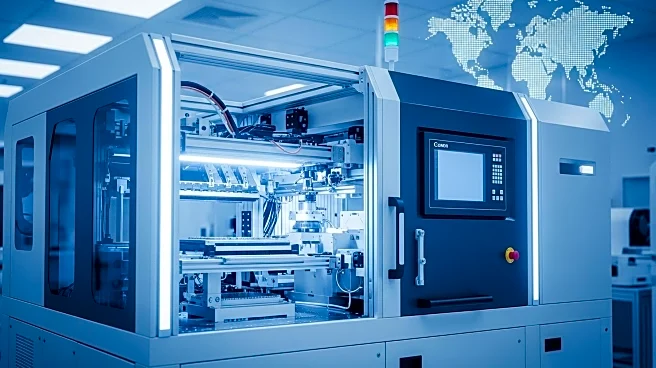What's Happening?
Dutch tech giant ASML has reported stable profits for the third quarter of 2025, with net profits reaching 2.125 billion euros, slightly up from 2.077 billion euros in the same period last year. However, the company has issued a warning regarding a significant
decline in its China sales for 2026. ASML, known for manufacturing advanced semiconductor machines, anticipates a drop in demand from Chinese customers, which could impact its overall sales performance. This development comes amid heightened geopolitical tensions between China and the Netherlands, particularly after the Dutch government took control of a Chinese-owned chipmaker, citing national security concerns. ASML's CEO Christophe Fouquet noted that while the company expects a 15% increase in total net sales for 2025, the outlook for 2026 remains uncertain due to these geopolitical factors.
Why It's Important?
ASML's warning about declining sales in China is significant as it highlights the impact of geopolitical tensions on global semiconductor supply chains. The company's machines are crucial for producing semiconductors, which are essential components in various technologies, including smartphones and military equipment. The U.S. has been actively restricting high-tech chip exports to China, fearing their potential use in military applications. ASML's situation underscores the broader geopolitical struggle over technology and trade between China and Western nations. The decline in sales could affect ASML's financial performance and influence the semiconductor industry's dynamics, potentially leading to shifts in global supply chains and market strategies.
What's Next?
ASML plans to provide more details on its 2026 outlook in January, as it navigates the challenges posed by geopolitical tensions. The company is also focusing on the rapidly expanding AI market, which it believes will drive its annual sales to between 44 and 60 billion euros by 2030. Meanwhile, the Dutch government's intervention in the chip industry, particularly its control over Nexperia, may lead to further legal and diplomatic actions. Parent company Wingtech is seeking support from Chinese authorities and considering legal action, which could escalate tensions and impact international trade relations.
Beyond the Headlines
The geopolitical tensions surrounding ASML and the semiconductor industry reflect broader ethical and strategic considerations. The struggle for technological dominance raises questions about national security, economic independence, and the ethical implications of restricting technology access. As countries strive for self-sufficiency in semiconductor production, the industry may witness long-term shifts in manufacturing locations and investment strategies, potentially altering the global economic landscape.















